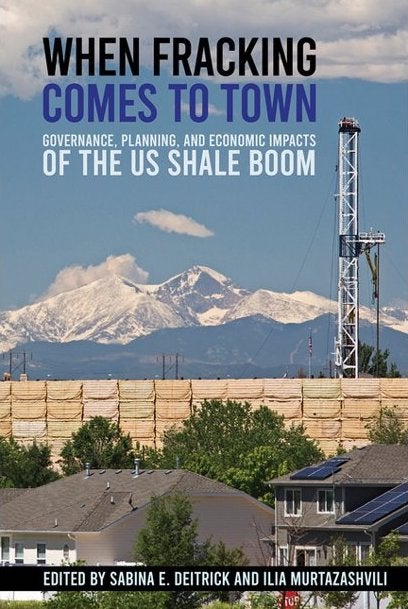 When GSPIA Associate Professors Sabina Deitrick and Ilia Murtazashvili convened a workshop of colleagues to discuss the impacts of fracking from the perspective of local government – a complex angle that’s often absent from debates about the industry – the resulting conversations were so great that they wrote a book.
When GSPIA Associate Professors Sabina Deitrick and Ilia Murtazashvili convened a workshop of colleagues to discuss the impacts of fracking from the perspective of local government – a complex angle that’s often absent from debates about the industry – the resulting conversations were so great that they wrote a book.
When Fracking Comes to Town: Governance, Planning, and Economic Impacts of the US Shale Boom tells the story of community resilience with the rise and decline of shale gas production.
Published by Cornell University Press, When Fracking Comes to Town embraces nuances beyond the pro- or anti-fracking debate, as their contributors explore the complexity of small community responses to wealthy oil and gas companies.
“Despite the known risks and negative impacts on health and environment, for local officials, bringing outside money into their communities for many of them is one of the most important reasons for fracking,” explains Deitrick.
Rather than cast communities as powerless, When Fracking Comes to Town showcases the adaptability of local rules and regulations to meet the novel challenges accompanying unconventional gas extraction through fracking.
Potter Township, about 30 miles northwest of Pittsburgh, where Shell announced its plans to build a massive, multi-billion dollar petrochemical plant known as the “ethane cracker,” is an example of one such story.
“Potter Township was hit with a sledgehammer,” said Deitrick. “No one bothered to tell the local officials. They learned the same way anybody else following the news that day learned.” A community used to chemical manufacturing, they knew better than to rally against it. “They knew they probably had no chance."
“But it was a community that learned to use its resources and expand its existing capacity to embrace the partnerships that came with that to gain more on the environmental side,” explained Deitrick, “to gain on resources, to improve other parts of their infrastructure, and improve their quality of life that was going to be affected quite mightily by the Shell plant.”
Read (or listen) to Deitrick’s in-depth interview with Kara Holsopple of the Allegheny Front discussing more stories of resilience and adaptability from the book here.